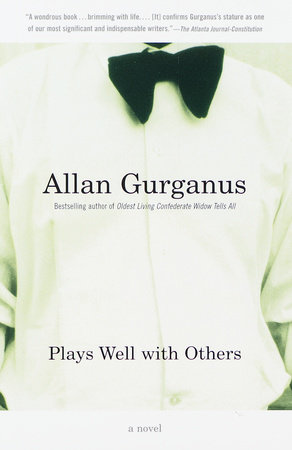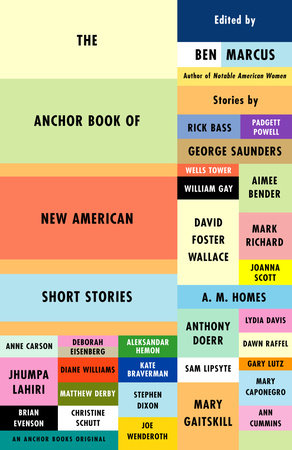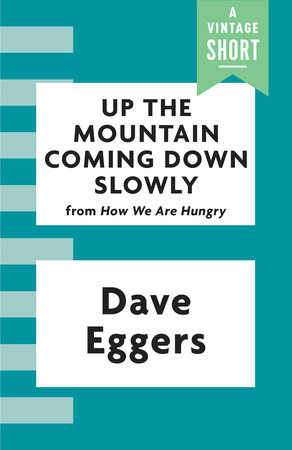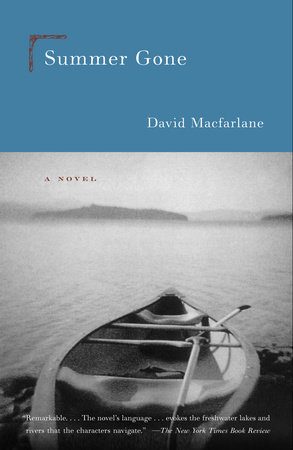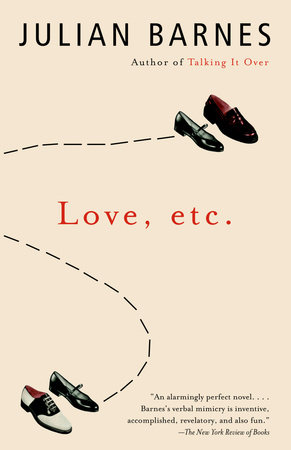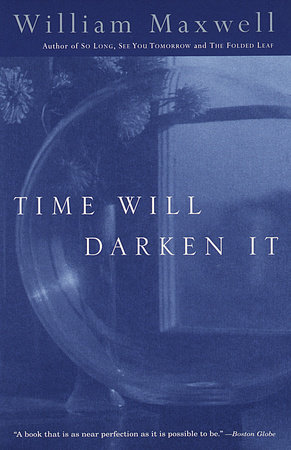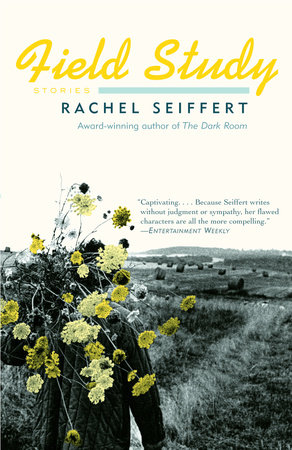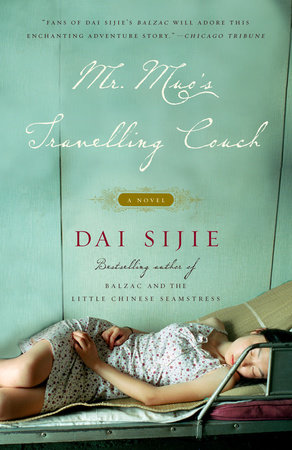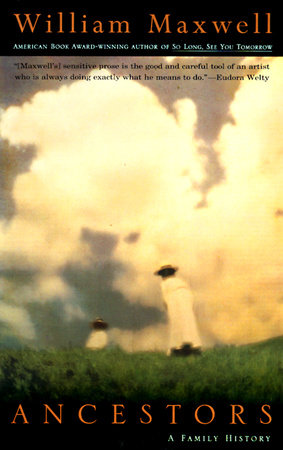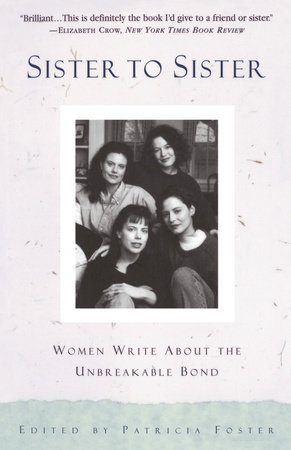Q: In your new novel, Plays Well with Others, you describe young New York artists defending each other during the siege of AIDS. Surely by now the pandemic has been treated in depth. Why your novel and this topic now?
A: I write the funniest books possible about the worst things that can happen to people. The work’s energy springs from this essential tension in our lives. In Plays Well with Others, it’s the Kids vs. the Virus. The book is effective to the exact degree that it stays funny. It reads like a love poem and a whodunit. Most of us kids had only lived in New York four years or so, just getting going as starving artists, just coming to depend mainly on each other. That’s when the truest hardship struck. Now, medicine is improving and we know more. A novelist can look back sixteen years to the fear and heroism this epidemic first inspired. Doesn’t it seem about a century ago!
You must search history to find precedents: the Abolitionists who said "Enough" and helped end slavery, the early Christians hiding while rerouting world history. My book concerns the creation of a loving, even comic, community in response to this unaccountable riptide. Most of the novel involves the founding of a group, the crossed allegiances and early promise of young artists in Manhattan. I consider the response to AIDS the greatest civilian mobilization since Abolition. First encounters with the virus made for moments both terrifying and heroic. Who will protect the village from the giant? And the little tailor volunteers. My book is told as a fairy tale. It’s that improbable.
Q: Could you describe the process of writing the book? Was it long in coming?
A: Oldest Living Confederate Widow Tells All took me seven years towrite; White People gathered two whole decades of my stories. But the new novel could’ve only arrived in a rush. It was decades ingestation. But a fast delivery. Last year, just after my mother died, I reread my essay in progress called "On Whether to Purge the Dead from One’s Address Book." Somehow, from November to March, after the eleven months during which both my parents expired, that essay became this novel. I had been trying to write all during my folks’ declines. Now, I was suddenly spared the role of worrier and bedside attendant. Without an impending vigil, this book became my alternate task and caretaker’s joy; I wrote it in longhand with such a rush of pleasure, release. I felt panicked only that I’d be hit by a truck before finishing it. The novel is a love poem to a lost community. At times, I felt like a twenty-first-century archeologist writing about Pompeii the day before that August volcano struck. Ordinary life yields such sweetness, looking back.
This book tests the possibility of what art–the most private and communal of acts–can save. It seeks to establish just how much we owe our parents. It pays tribute to that great flurry of energy, Manhattan during the 1980s. It salutes and reinvents certain of my brilliant missed ones. Finally, it asks how much caretaking costs us, the survivors.
In 1981, if you found the spot on your arm, you simply made yourself comfortable, you wrote the will, phoned your friends, got ready. It’s a circumstance medieval. Those first days gave rise to much magical thinking, much Dark Ages bigotry. The moment also abounded with unpredictable braveries, often from those who seemed far too spacey, fey, or scatterbrained to endure such a literal deadline. Now, with breakthroughs in drug treatment, people (those who can afford such measures) expect longer lives with greater strength.
Those of us who, through no merit of our own, survived, can only feel permanently changed, incredibly enlarged. The pandemic enlisted us: selfish people from a selfish age. It made us nurses. And when the nursing was over, it left us philosophers, professional hospital jesters, cool-eyed witnesses, and finally rejoicers. Without it, would we still be as silly as our theme song, the glitzy disco music of 1979?
Q: You have always described yourself as a comic writer. Did you (given the subject matter of Plays Well) feel forced to suspend all that this time out?
A: Oh Lord, no. All decent after-dinner speakers start with a joke toindicate (and assure you of) impending seriousness. Only humor permitted me to get far enough in to learn the event’s essential news. The decade that spilled into pandemic was such a wild romp. We took that scary energy along with us; we rode it right into the downward spiral.
As the novel progressed, I tried to preserve that sense of Preston Sturges’s forward gallop, the farcical, the heartfelt, the horny, even the silly and the stupid. Glitter and dinge coexisted so happily then. There was this irresistible party-animal momentum still carrying you. That, in part, saw us through. Adrenaline, testosterone, cappuccino, cocaine, heartache alternating with the loves of your life, it makes for quite a brew. We were young and new to New York, and our talent kept us ambitious; we had this running start on life.
Writing tragically about the tragic is like trying to outstare the sun: you go blind before it does. By entering the maelstrom smiling, I replicated how we ran smack into the wall of it. The plague first registered as a prank, a little pie in the face. "No way, not us!" At first it seemed that a strong note from our parents, some reprieve from the Governor, could forestall such trouble. Till IT, we’d lived so lucky.
Q: Your novel is divided "Before," "After," and "After After"? Where does this doubled addendum come from? How does it reflect the book’s moral scheme?
A: "Before" means previous to anyone’s guessing we couldn’t get sick with anything worse than a hangover. Before we knew that even one of us was actually, you know, mortal. "After" indicates that shocking knowledge–not even of the sickness itself, but the sudden awareness that, however gifted and good-looking and hopeful we were, we too could die, we must.
"After After" suggests today’s strange limbo, a hindsight that is the historian’s great advantage, sweet consolation, and steepest barrier.
But if you are true to your loved ones long enough, they can come back to you. The memories grow more textured, the detail becomes much richer. Angie Alabama Byrnes is one of three main figures of the book, a semi-deb from Savannah who comes to New York to paint, a tough sexual adventurer who happens to be as momentously gifted as she is deeply insecure. The narrator loves her and Robert Christian Gustafson, known as "The Most Beautiful Boy of His Decade in New York." He is also the composer of a Symphony Number One: The Titanic, based on his obsession with the sunken liner. How this pair and the narrator make their art and mythologize each other into being, while getting invited to all the best orgies of the period, this provides the book’s forward gallop.
All the characters in my book are invented, and yet they’re loving composites of the insanely attractive, deeply committed young artists I met upon arriving in New York just as the eighties did.
Q: The three main characters of your novel are artists–a composer, a painter, and the writer of the book, Hartley Mims, jr. Do you think their artistic play helped them through their communal crisis? Are artists luckier than other people in having work as their own think tank and superstitious refuge?
A: Oh, yeah. At age five, everybody is an artist. Put crayons and big paper before any kids, they’re fearless and inventive and entrancing. But by age twelve, many will tell you they’re "just no good at drawing." Who got to them so early? Who hurt them into giving up so soon?
The main characters of this book were too dim or pigheaded to let that self-consciousness cork them up for very long. They never gave the crayons back. What moved me, during the pandemic, was seeing my doomed friends turn to their work for answers, succor, immortality.
Plays Well with Others is a direct quote from my second-grade teacher’s evaluation of my own dicey character. Such faint praise followed her accusations about my talking in class, working far below potential, being latently artistic if "actively messy."
Playing is serious business. Play is often that part of ourselves that proves most laborious to keep alive. I intended to re-create, with this book, a circle that was sexually driven, eager for attention, enragingly idiosyncratic, but dedicated to playing, in art and in playing with each other, sexually and psychically. Finally, Play gives us the sense of joy at the random. Play becomes the salvation of the book’s young artists, even those who survive only in what their crayons found the time and wit to save.
Q: You served in the Navy, surviving the Vietnam War. You’ve said you used the experience to describe the soldiering in Widow. You also emerged from the mixed blessing of being a gay man who outlived much of his own generation in New York. Can you claim there’s been a value to the pandemic’s suffering?
A: In Melville’s greatest story, he presents a stubborn isolated character who answers every question, "I would prefer not." That would be any sane person’s answer to the curse of HIV. But given that we couldn’t avoid it, considering that certain breakthroughs toward cure have been made, seeing we can now look back on its radically different early days, all we can ask now is what, if anything, we’ve learned.
Part of my inherent optimism as a writer comes from my belief that one can learn from experience. A writer with Big Lessons to impart is dreary. But any novelist unwilling to let his characters grow within their own bettering experience is simply not worth reading. I don’t read or write as an escapist, I read and write to enter the world correctly. Which is, as it happens, the most narcotic form of escape, into self-knowledge.
Q: The self-knowledge that humor provides?
A: Oh, yes. The story of the person battling, then going down to the disease, has been told and retold, and often very well. Sometimes such accounts suffer from a pathos that blinds us to the real motion of irony, the humor that exists in every human moment, even mortal ones, especially those. Gallows humor, I believe, ranks among our species’ greatest achievements.
What I’ve tried to do in Plays Well with Others is chronicle that caretaker’s role. I mean the person stuck in the unasked-for role as Last One Standing. The guy who cleans out the apartments, who greets the Midwestern parents, who defoliates the home place of didoes and porn, the one who then escorts the bodies home. It’s left to this survivor to say what, if anything, has been gained.
Finally, salvation is the impulse to seek some. I feel, in completing this book, that I’ve partly repaid a great debt. Not only to friends alive, not just to my much-missed parts, but to those fellow-sufferers, the fun-loving readers I’ve not yet met. Writing is one form of caretaking. We all doubt that, offered the challenge, we would really buck authority. Might we really hide our endangered friends in our basement? Could we risk the necessary sacrifices?
To have taken care of your loved ones, to feel quietly proud of facing the greatest imaginable losses, to have somehow resisted cynicism and the Niagara attractions of death itself, this constitutes a huge subject, a great lesson. Only in creating Angie, Robert, and Hartley, with their unreasoning love for each other across the improbabilities of sexual tastes and sudden Job-like woes, only in finishing the book did I feel some cooling final chord change, resolution. I hope some of that music lives in many sentences of this novel. It is, at great cost, a funny book and, I hope, still a very sexy one. It must be both, because that young–we were all hilarious and gorgeous. We assumed that everybody was and would always be. We assumed so much, despite everything that had to happen.
Writing the book was a sustaining act, the love it released in me felt brand-new somehow. It literally saved my life. Remembering-inventing Then and Them pulled me briskly back into the world, gave me something that felt as promising as an infant to take care of. Odd how newness keeps breaking out of the bleakest things that overtake us.
What we are left with–in life and fiction–is the holy ability to remember. Even after so much is lost we learn–when possible–to laugh. The Widow says, He who laughs, lasts. I consider this book, like hers, a comic war novel.
To laugh with admiration at the outrageous behavior and dress-up of our friends. I’d like to giggle, as they did, whenever I honestly can. That, I know, is their preferred memorial.
A good laugh, it’s my favorite way of remembering.
